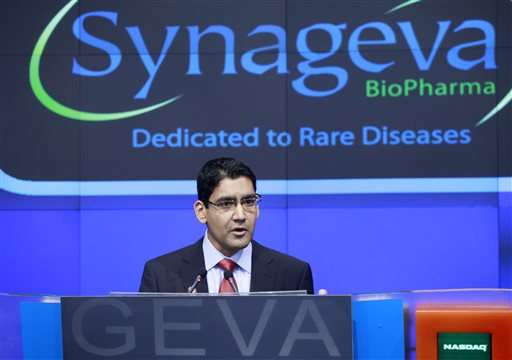In this Nov. 3, 2011 file photo, Sanj Patel, President and CEO of Synageva BioPharma Corp., attends the opening bell ceremony at Nasdaq in New York. Alexion Pharmaceuticals on Wednesday, May 6, 2015 announced it is spending $8.4 billion to buy fellow rare disease treatment maker Synageva BioPharma, a company with no products on the market. (AP Photo/Mark Lennihan, File)
Alexion Pharmaceuticals will pay a huge premium to buy Synageva BioPharma in an $8.4-billion deal for a rare disease treatment maker that lost nearly $60 million in the first quarter and has no products on the market.
Alexion made the deal, announced Wednesday morning, more for what Synageva can offer rather than what it already provides. That includes access to a potential blockbuster drug and stronger footing in lucrative field where drugmakers can command top dollar for treatments without facing fierce negotiations from insurers and other payers.
Synageva's pipeline of products under development includes Kanuma, a potential treatment that's currently being reviewed by the Food and Drug Administration, which is expected to decide by September whether to approve it. Kanuma treats lysosomal acid lipase deficiency, a disease that causes the buildup of fatty material in the liver and blood vessels and can cause serious health problems or death.
A decision from European regulators is expected in the second half of the year as well, and Alexion executives told analysts Wednesday morning that they expect sales from that drug to eventually top $1 billion annually and provide a steady revenue source through the next decade.
"We are acquiring Kanuma at the right point in time, before approval and when we can shape the global launch plans to serve the greatest number of patients," CEO David Hallal said.
Shares of Synageva BioPharma Corp. more than doubled in value Wednesday after Alexion said it will pay $115 in cash and a portion of its stock for each Synageva share. That puts the total per-share price at about $226, based on the Tuesday closing price of Alexion shares.
That's a premium of about 136 percent to Synageva's $95.87 closing price on Tuesday.
Lexington, Massachusetts-based Synageva brought in only $927,000 in royalty revenue during the first quarter, but it also has several other potential rare disease treatments under development, aside from Kanuma.
Alexion officials said the deal will help their company diversify its revenue growth. Alexion Pharmaceuticals Inc. is based in Cheshire, Connecticut, and makes Soliris, which is approved to treat a rare, life-threatening blood disorder called paroxysmal nocturnal hemoglobinuria.
Many medicines for rare diseases sell for $100,000 or more for a year of treatment, although drugmakers usually give financial aid to patients and big discounts to insurers and government health programs.
Rare disease treatments generally focus on small patient populations and can save lives or make a big difference in a person's condition, factors that help make them lucrative for drugmakers, according to Steve Brozak, who follows the pharmaceutical industry for WBB Securities.
He said these treatments are hard for generic drugmakers to copy, which helps protect the owner from cheaper competition. Their patient populations also are small and generally covered by several insurers, so the drugs tend not to deliver a huge expense to any one insurer.
That means payers don't have a lot of motivation to deny coverage or restrict treatment like they've done for the latest hepatitis C drugs, which can be used by millions of patients.
"It's not a battle that the insurers are really going to fight for," he said. "There's no incentive for them to do it today."
Alexion expects to close its acquisition by the middle of the year. The boards of both companies have approved the deal.
Shares of Synageva were up about 115 percent, or $110.07, to $205.94 in midday trading Wednesday, while broader indexes slipped. Alexion shares, meanwhile, slid nearly 9 percent, or $15.10, to $153.45.
As of Tuesday's market close, Synageva's stock had climbed 3 percent so far this year, or about double the gain of the Standard & Poor's 500 index.
© 2015 The Associated Press. All rights reserved.




















